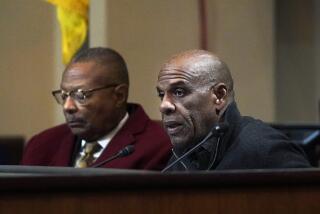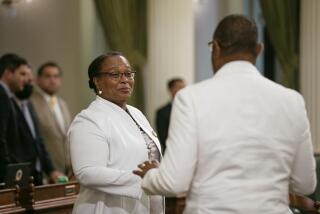At Apologizing, Men Are Sorry
- Share via
In keeping with the curiously tuned male emotional clock, a white Ohio congressman last week proposed that Congress apologize to African Americans whose ancestors suffered as slaves “under the Constitution and laws of the United States until 1865.”
Well, better late than never.
Glad to see things are improving in the contrition department. After all, it took the Vatican 359 years to apologize for persecuting Galileo, one of history’s greatest scientists. His sin? Advancing the theory that the Earth spins on its axis and orbits the sun. Heretical thinking in 1633. Not exactly the stuff of scandal in 1979, when Pope John Paul II appointed a commission to investigate the charges. Still, it took the commission another 13 years to determine the Church had erred.
If timetables hold, I suppose Geronimo Pratt’s descendants can expect to receive a condolence card from the FBI sometime in the spring of 2129.
*
When it comes to apologizing, no one knows exactly why men seem to have a more difficult time than women. It may have to do with the notion that admitting error implies weakness or fallibility.
This is why it should come as no surprise that institutions historically led by men (governments, religions and others) are slow to seek forgiveness from those they have wronged.
Studies cited by linguist Deborah Tannen have shown that while men sometimes apologize to women, they rarely apologize to other men. Women are much more likely than men to apologize after giving offense. (Stellar exception: Marge Schott.) I happen to think women apologize to the point of ritualized absurdity. It is not unusual, for instance, to hear a woman apologize for the weather:
“How was your vacation?”
“It rained a lot.”
“I am so sorry.”
Perhaps a clue to Male Apology Aversion Syndrome can be found in House Speaker Newt Gingrich’s rejection of Rep. Tony P. Hall’s slavery apology proposal. He dismissed it as “emotional symbolism.”
To which most women I know would reply: “And your point would be?”
Women thrive on emotional symbolism. An apology is an expression of regret, by definition symbolic. It’s why the greeting card industry loves us. It’s what keeps the floral business booming. It’s the only time words speak louder than actions.
“When you’ve hurt somebody, nothing solves the problem like a good old-fashioned apology,” Hall said. “Then we can begin to heal.”
Anyhow, guys, it’s not as though anyone in Congress is proposing to augment the apology with 40 acres and a mule to each slave descendant. Who would believe them if they did?
*
Perhaps the Vatican’s apology to Galileo and admission that the Earth does indeed turn on its axis has finally caused the earth to move in other ways. In the last few years, there has been what Times religion writer John Dart, in a fabulous turn of phrase, called an “outbreak of ex post facto mea culpas,” at least in the Christian world.
He noted in a 1995 news story that white Europeans apologized to Muslims for the carnage inflicted by knights of the Crusades (more than half a millennium later), that Lutherans apologized for the anti-Semitism of Martin Luther (450 or so years later), that Southern Baptists apologized for “a bitter harvest of racism” that resulted from the denomination’s founding as a haven for Southern slave owners (150 years later) and that Japanese Christians apologized for the bombing of Pearl Harbor (50 years later).
It’s not as if no American government precedent exists for the ex post facto mea culpa. In 1988, the U.S. government apologized to Japanese Americans interned during World War II, and even gave each camp survivor $20,000.
President Clinton, a man so in touch with his feminine side that he not only loves a good, old-fashioned apology but he likes to follow it with a good, old-fashioned cry, recently apologized on behalf of the nation to the African American men who were unwitting subjects of the government’s infamous Tuskegee syphilis study.
Was that emotional symbolism? You bet. The damage was done long ago and is irreparable. Many of the men infected their wives and children. Many died for no good reason. How can anyone deny the importance of the president’s gesture?
Monday, the president said the slavery proposal had caught him off guard--even though he has made the repair of race relations a priority for his second term--but that he would consider supporting it.
Republican Sen. Trent Lott announced he would probably vote against the measure if it ever makes it to the Senate floor. “I think we should be looking at the future,” Lott said on a TV news show. “We should have an apology for what is happening in America today--the poor schools, the lack of opportunity.”
Will Lott formalize his proposal?
Don’t hold your breath.
* Robin Abcarian co-hosts a morning talk show on radio station KTZN-AM (710). Her column appears on Wednesdays. Her e-mail address is [email protected].
More to Read
Sign up for Essential California
The most important California stories and recommendations in your inbox every morning.
You may occasionally receive promotional content from the Los Angeles Times.











